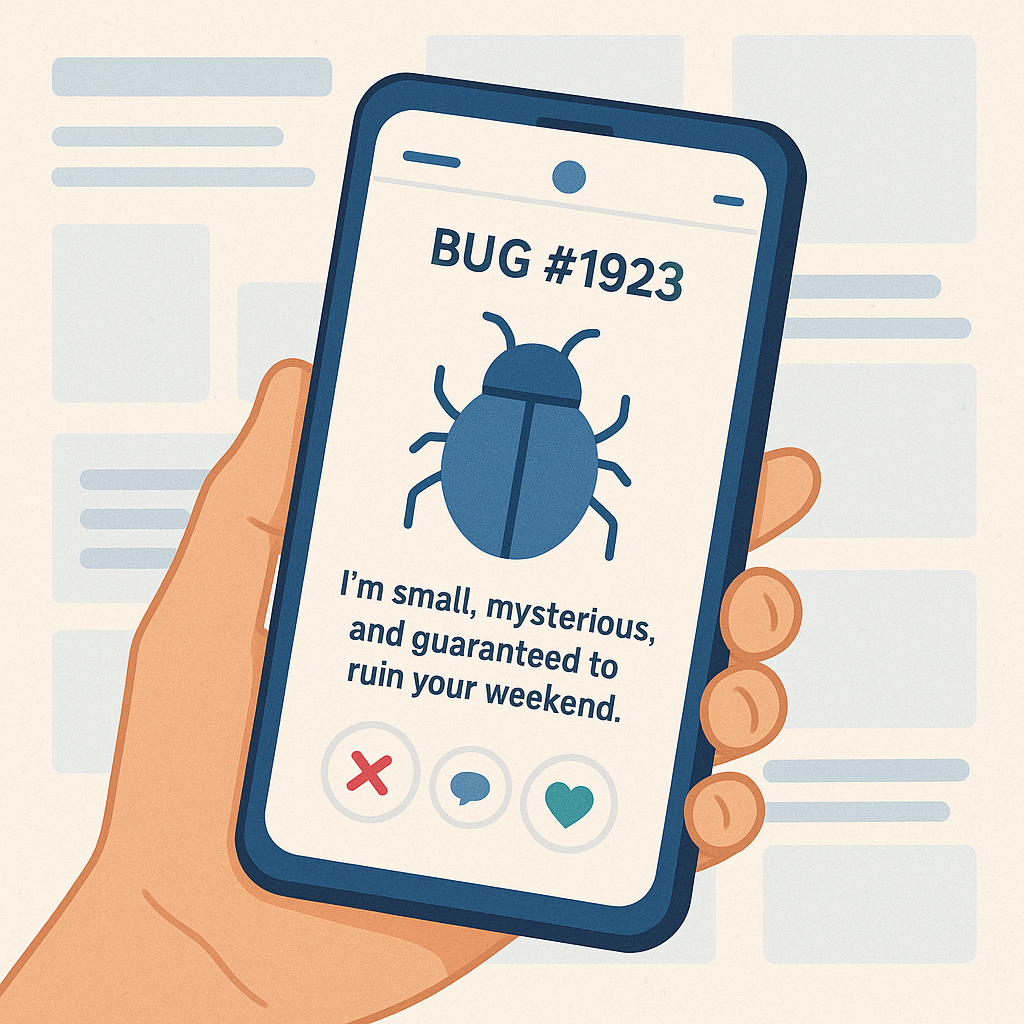From Ghost Tickets to Drama Epics: Swiping Through the Jira Backlog

The other day I opened Jira, stared at the backlog, and had a very unhelpful thought:
“This feels exactly like swiping through a dating app.”
You’ve got the ghosts, the drama kings, the over-sharers, the ones who look good at first but turn out to be way too much work… and every now and then, a hidden gem that makes you think, “where have you been all my life?”
So here’s what I imagine some of those tickets would sound like if they had dating bios:
🐞 Bug #1923
“Small, mysterious, and guaranteed to ruin your weekend.”
- Found in production on a Friday at 4:55pm.
- Nobody knows why I exist, but everyone’s scared to close me.
- You’ll think I’m gone, then I’ll show up under a brand-new ID.
💡 Reality check: These are the zombie bugs. They’re less about code and more about courage. If they keep haunting your backlog, it might be time for a ritual to actually close things out with confidence.
📝 Feature Request (Opened 2021)
“Still waiting for someone to notice me.”
- Last touched by @former_employee.
- Dreaming of the day I make it to sprint planning.
- Acceptance criteria? Still loading…
💡 Reality check: This is clutter, plain and simple. Old tickets are like old matches—you feel guilty letting them go, but leaving them hanging around only slows everyone down.
🚀 Epic: “Improve Performance”
“I’m vague, but I promise I’m important.”
- My description is basically a horoscope.
- Everyone agrees I matter, nobody knows what I mean.
- Best at parties where metrics are undefined.
💡 Reality check: Big fuzzy epics don’t get work done. Without clarity, they just hang around, making your backlog feel endless.
⚡ The Over-detailed Ticket
“Here’s a 12-step manifesto on renaming a button.”
- Screenshots, diagrams, novels attached.
- Acceptance criteria reads like a legal contract.
- You’ll wonder if it’s worth the effort.
💡 Reality check: Over-specification usually comes from a trust gap. More detail doesn’t always mean more clarity—it just drains the joy out of doing the work.
👻 The Ghost Ticket
“No description. No context. Just vibes.”
- Title: “Fix stuff.”
- Priority: Highest.
- Assigned: To you. Always you.
💡 Reality check: Ambiguity kills momentum. Someone skipped the hard part—explaining the why. And “just vibes” doesn’t ship reliable software.
🎢 The Never-ending Bug
“I’ve been reopened 6 times. Commitment issues? Maybe.”
- Everyone thought they fixed me. They didn’t.
- I’m basically family now.
- Release notes: “Still investigating.”
💡 Reality check: If bugs keep coming back, you’re not just patching code—you’re patching culture. It’s a sign of fragile systems or quick fixes stacking up.
🧩 The Pet Project Ticket
“Nobody asked for me, but I’m fun.”
- Opened at midnight by That One Dev™.
- Half a branch already exists.
- Not aligned with any sprint goal, but hey—shiny.
💡 Reality check: These tickets show creativity, but if they run unchecked, they can quietly pull focus away from what actually matters.
❤️ The Hidden Gem
“I’m small, low effort, and I’ll quietly make everything better.”
- Still marked “low priority.”
- Been here forever, waiting patiently.
- The one you’ll regret not picking sooner.
💡 Reality check: These are the quick wins. Done at the right time, they boost morale, clean things up, and remind the team that progress doesn’t always have to be painful.
Final Thought
Your backlog will always have a mix of ghosts, catfish, and diamonds in the rough. The trick is remembering that Jira doesn’t just reflect work—it reflects how your team works together.
So the next time you’re scrolling through tickets, don’t just swipe left in frustration. Remember: every “profile” says something about your culture. And when you swipe right, you’re really choosing how much sanity your team gets to keep.

